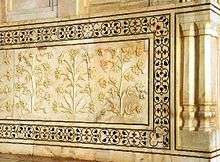Definify.com
Webster 1828 Edition
Dado
D'ADO
,Definition 2026
dado
dado
English

Noun
dado (plural dados or dadoes)
- (architecture) The section of a pedestal above the base.
- (architecture) The lower portion of an interior wall decorated differently from the upper portion.
- (carpentry) The rectangular channel in a board cut across the grain.
Translations
|
Verb
dado (third-person singular simple present dadoes, present participle dadoing, simple past and past participle dadoed)
Translations
|
Derived terms
Galician
Etymology
From Old Portuguese dado, from Latin dātus.
Verb
dado m (feminine singular dada, masculine plural dados, feminine plural dadas)
- past participle of dar
Italian
Etymology
Uncertain. Perhaps from a Vulgar Latin *dadu, itself either from Latin datum (“thrown, given”), or from Arabic أَعْدَاد (ʾaʿdād, “numbers”). Compare Spanish and Portuguese dado, Catalan dau, French dé.
Pronunciation
- Hyphenation: dà‧do
- Rhymes: -ado
Noun
dado m (plural dadi)
- (gaming) A die or dice.
- A stock cube.
- nut (intended to be screwed onto a bolt)
Anagrams
Old Portuguese
Etymology
From Vulgar Latin *dadu, itself either from Arabic أَعْدَاد (ʾaʿdād, “numbers”), or from Latin dātum.
Pronunciation
- IPA(key): /ˈda.do/
Noun
dado m
- die
- 13th century, attributed to Alfonso X of Castile, Cantigas de Santa Maria, E codex, cantiga 294 (facsimile):
- Como hũa moller q̇ iogaua os dados en pulla lançou hũa pedra aa omagen de ſ[ant]a mari[a] por q̇ perdera ⁊ parou un angeo de pedra que y eſtava a mão ⁊ reçibiu o colpe.
- How a woman who was playing dice in Apulia threw a stone at the statue of Holy Mary because she had lost, and an angel of stone which was there reached out its hand and received the blow.
- Como hũa moller q̇ iogaua os dados en pulla lançou hũa pedra aa omagen de ſ[ant]a mari[a] por q̇ perdera ⁊ parou un angeo de pedra que y eſtava a mão ⁊ reçibiu o colpe.
- 13th century, attributed to Alfonso X of Castile, Cantigas de Santa Maria, E codex, cantiga 294 (facsimile):
Descendants
Portuguese
Pronunciation
- (Portugal) IPA(key): /ˈda.ðu/
- Hyphenation: da‧do
- Rhymes: -adu
Etymology 1
From Old Portuguese dado, itself from a Vulgar Latin *dadu, of uncertain origin; possibly from Classical Arabic أَعْدَاد (ʾaʿdād, “numbers”), or more from Latin dātum. Compare Spanish dado, Catalan dau, Italian dado, French dé.
Noun
dado m (plural dados)
- (gaming) A die.
- Alguns jogos utilizam um dado que vai até 100.
- Some games use a die numbered up to 100.
- Alguns jogos utilizam um dado que vai até 100.
Descendants
Etymology 2
From Old Portuguese dado, from Latin dātus. See dar.
Adjective
dado m (feminine singular dada, masculine plural dados, feminine plural dadas, comparable)
- offered
- granted, conceded (given)
- given, fixed
- Em um dado momento.
- At a given moment.
- Em um dado momento.
- friendly, sociable
- Eles são muito dados.
- They are very friendly.
- Eles são muito dados.
- prone, inclined
Noun
dado m (plural dados)
- (computing, sciences) data (information)
- Não encontrei nenhum dado no sistema.
- I did not find any data from the system.
- Não encontrei nenhum dado no sistema.
Synonyms
- (offered): oferecido
- (conceded): concedido
- (fixed): determinado
- (friendly): afável
- (prone): propenso, inclinado
Verb
dado
- past participle of dar
Spanish
Pronunciation
- IPA(key): /ˈdado/, [ˈd̪aðo]
- Hyphenation: da‧do
Etymology 1
From a Vulgar Latin *dadu, of uncertain origin; perhaps from Arabic أَعْدَاد (ʾaʿdād, “numbers”), or alternatively from Latin dātum. Compare Portuguese dado, Catalan dau, Italian dado. Cf. also French dé.
Noun
dado m (plural dados)
Etymology 2
Verb
dado m (feminine singular dada, masculine plural dados, feminine plural dadas)
- Past participle of dar.